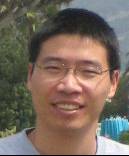蒋轶博士学术报告通知
学 术 报 告 会
题 目: From Matrix Decomposition to Channel Decomposition:
A Path to Achieving MIMO Limit
报告人: Dr. Yi Jiang
San Diego, CA, USA, Qualcomm Inc.
时 间:2010年3月2日(星期二)下午14:30
地 点:电三楼314室电子工程与信息科学系第一会议室
主 办:信息学院电子工程与信息科学系
Abstract:
The MIMO (multi-input multi-output) technology is the key to the next-generation broadband wireless communications, such as the LTE and the Gigabit WiFi. In this talk, we start with an in-depth analysis of the classic V-BLAST technique. Although the V-BLAST is almost as old as the notion of MIMO, it is found to have some properties which still surprise us. We will then go on to introduce a class of nonlinear MIMO transceiver designs, which combine the V-BLAST receiver and a precoder which is a function of the channel state information at the transmitter (CSIT). One design of particular interest is the so-called uniform channel decomposition (UCD) which can transform a MIMO channel into several identical scalar ones without causing capacity loss. The design of the MIMO transceiver is made possible by a new matrix decomposition technique called the generalized triangular decomposition (GTD), which finds its applications in areas much broader than the MIMO transceiver design.

Bio:
Yi Jiang received his B.Sc. degree from the University of Science and Technology of China (USTC) in 2001 and the Ph.D. from the University of Florida in 2005, both in electrical engineering. From Sept. 2005 to May 2007, he worked as a Postdoc in the University of Colorado, Boulder. Since 2007 he has been working in the industry as a wireless system engineer. He is currently a senior system engineer of Qualcomm Inc. at San Diego. Dr. Jiang has more than 30 publications, including 12 journal papers and one co-authored book. His research interests are in the areas of signal processing, wireless communications, and information theory.
欢迎感兴趣的老师和学生参加。
